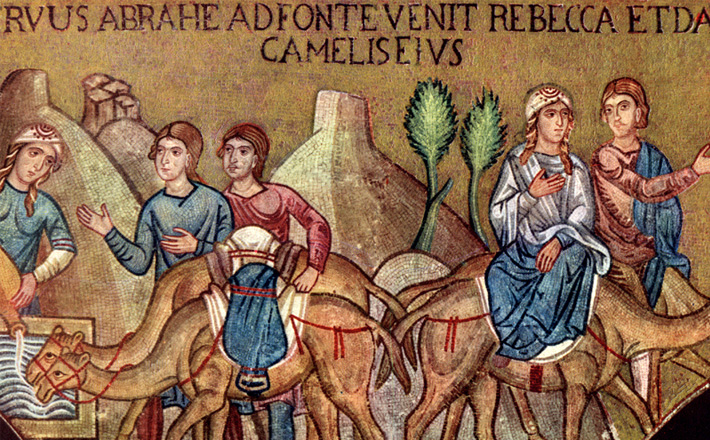Commentary on Zechariah 9:9-12
The Bible is replete with images of hope.
The image of a king riding on a donkey, a commander of peace, prisoners set free and restoration surely is one of its most poignant images. Times were unimaginably difficult. Cyrus’s decree was the backdrop for what was, in effect, a second exodus, a new beginning, for the beleaguered Israelite community.
Inspired by God to leave everything and start anew in an unknown land, Abraham was the first of the ancestors to make the journey into Canaan. Generations later, Moses led the enslaved community to freedom and returned to this Promised Land. Somehow, despite the odds, the community survived defeat and exile into Babylon. The time had come to return home. The task was daunting. There was so much work to do. Is it any wonder that people became discouraged and stopped the work midstream? Sixteen years and no progress at all. If Israel was to have a future, the work had to begin again. What would it take to get the work going again?
Perhaps people did not understand that there is a connection between the quality of life in a community and its care for sacred places and spaces. Not just symbolic, the practical side of everyday life, how people made decisions, how they interacted with one another, how they organized their life together was all affected by their respect and care for the temple.
Enter Zechariah. He understood the connection. He knew the difference it would make and could envision the work completed. He would not let Israel stay mired in the doldrums. His words encouraged the community to finish the work, to begin again. He extorted people to put away their sins, to rebuild their lives and their temple.
Israel’s kings were to be guided by God, to live moral lives and govern ethically. Although a few had God’s approval, most did not. Most lived loosely and contributed to Israel’s decline. Perhaps he recalled that having a king was a concession that God made to Israel after warning them not to have one since kings would likely abuse their power and misuse the trust that had been given to them. Even the beloved David had done just that. As successful as he was, his relationship with Bathsheba was the beginning of troubles for both his family and his kingdom.
Zechariah envisioned a leader, a Messiah, who would live without the excesses of previous kings. One who would live righteously and lead justly. What better way to express his vision than to write of a king “triumphant and victorious, yet humble and riding on a donkey” (Zechariah 9:9). People would understand that unlike other leaders who rode horses, symbols of victory in war, Israel’s leader would instead ride a donkey. He would lead by persuasion, not by coercion, physical or military force of any kind. This leader would rule not just Israel, but all nations.
Jesus knew this passage and intentionally fulfilled it by riding on a donkey on Holy Sunday at the beginning of Holy Week. However, at the time of this writing, Zechariah was thinking about his own day and time.
For a people who felt forgotten by God, news of setting prisoners free would be just the reminder the people needed. After all, although they had a certain freedom in Babylon, the fact is that in exile they had been prisoners of war and were not truly free. Any sense of freedom that they had was really just an illusion. Real freedom was in Israel, not in Babylon hundreds of miles away.
With the use of the image of the leader riding on a donkey, Zechariah was able to pull together opposites representing the best and worst of times, hope and despair, with the expectation that with God, all would be right with the world. Mention of the king’s ability to “cut off the chariot from Ephraim and the war-horse from Jerusalem” (Zechariah 9:10) is disturbing. Yet, who would want a leader that could not deal effectively with issues, problems, and challenges of living? Similar to the Passover remembrance that Israelite freedom came at the price of Egyptian devastation, this passage reminds the reader that what happens in one nation is affected by what happens in another.
I am reminded of the words of a song, “Everything is Gonna Be Alright.”
Verse 1– I’ve got a feeling everything’s gonna be alright (3) Be alright (3).
Verse 2 — Jesus told me everything’s gonna be alright (3) Be alright (3).
Verse 3 — I’m not worried everything’s gonna be alright (3). Be alright (3).
Verse 4 — If I trust Him, everything’s gonna be alright (3). Be alright (3).
Verse 5 — I’ve got a feeling everything’s gonna be alright (3) Be alright (3).
More than once I’ve sung this song as a reminder that Jesus promised never to leave me. More than once I’ve sung this song to reassure myself. Somehow the words are just what I need to energize and encourage myself.
Zechariah’s words were just what his community needed to hear. He did his job well for the Bible tells us that after a work stoppage of 16 years the work began again and was completed. Similar to Zechariah and his community, people today need to hear words of hope. The Hebrew word for God, Yahweh, is a verb that implies God is dynamic, not static. The life of faith, therefore, need not be static. Rather, it is to be a life of growth and moving forward. It is to be a life of doing the work and getting things done. Whether regarding personal issues or concerns of a larger scope (communal, national, global, etc.), people need to hear words of encouragement. Preachers of the gospel would do well to preach in the spirit of Zechariah so that all might become “prisoners of hope” (Zechariah 9:12).


July 9, 2017